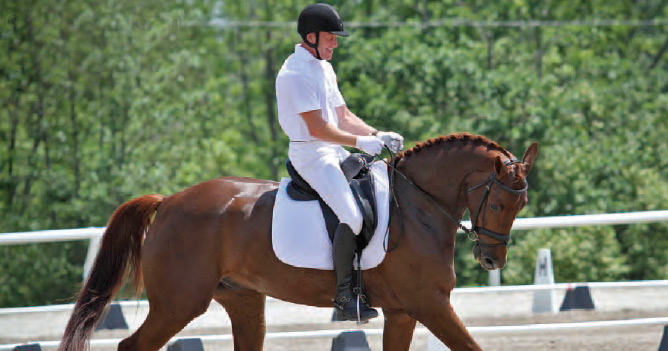A True Champion – Paying it Forward
June 2016 · Equestrian Therapy
JT Burnley’s father once beat him so badly, he broke JT’s arm. When the vice principal at his south Louisiana high school saw the 15-year-old’s swollen, purple limb, he must have made a call. Shortly afterward, authorities picked up JT and placed him in a juvenile detention center where he spent the next two months. It was 1975, and why JT was put behind bars, rather than Jim Burnley, is anybody’s guess. Regardless, JT finally found himself before a judge who said, “We have to remove you from your home for your own protection. We’re going to send you to Saint Francis Boys’ Home in Ellsworth, Kansas.”
“I don’t think I got along well at first,” said Burnley. “Saint Francis had a very structured system that I didn’t find appealing. But after a while, I started to like the structure. It was dependable; you always knew when to make your bed, when to go to chapel, when to eat breakfast, when to do your chores.”
Every boy had chores, and JT’s first assignment landed him in the kitchen, washing dishes. But it was hot, loud, and steamy near the dishwasher and he wanted to be outside. He’d been around horses most of his life and longed to work with the horses at Saint Francis. After three months in the kitchen, he finally got his chance.
“The horse barn was the first thing at Saint Francis that felt familiar to me,” he said.
Long denied a positive male role model, JT found two in Eric Muehleisen and Keith Bailey, counselors and skilled horsemen who were virtual opposites. Reserved and conservative, Bailey balanced Muehleisen’s wild side. Together, the two taught young JT much about horses and much about male friendship. He also met Cory Rathbun, a counselor just five years his senior.
During Ellsworth High School’s senior work week, Burnley wanted to do something with horses, so Rathbun got him a week working for his father, Ronnie, who owned a local cattle operation.
“The first time I ever heard a grown man call his father ‘Dad’ was when Cory took me out to meet his parents. My brother and I never called our father ‘Dad.’ We called him ‘Jim.’ And to see Cory put his arm around his father … without flinching … well, I’d never seen that before.”
Burnley turned 18 in 1978, which meant he could no longer stay at Saint Francis. He returned to south Louisiana to finish his senior year of high school. Within a week of graduation, he left for college. One week after that, his mother and brother left Jim.
To put himself through school, Burnley got a job at a horse stable, cleaning stalls and training horses for Western-style riders. One Saturday afternoon, running late for a date, he stopped briefly at the barn. That’s when he saw something that amazed him – a rider astride a beautiful gray Lipizzaner that almost seemed to be dancing.
“I didn’t know it was possible for a man to do that on a horse,” said Burnley. “I didn’t know what those maneuvers were called, but from that moment I knew horses would be part of the rest of my life. I didn’t go on the date. I got out of my truck and never left the gate. I was glued.”
From that point, Burnley immersed himself in dressage, a formal and highly skilled equestrian sport defined by the International Equestrian Federation (IEF) as “the highest expression of horse training where horse and rider are expected to perform from memory a series of predetermined movements.”
In 1979, Burnley’s trainer sent him to Germany to develop his skills. He told him, “Your hands are better than mine, but your skill set is too crude. I’m sending you abroad; don’t ever study with anyone who won’t be or hasn’t been an Olympian.”
Dressage is an expensive sport, and Burnley was still a poor college student. He worked feverishly to save money for three training trips to Europe – by cleaning stables, training horses, even washing dishes in a Mexican restaurant. On his first and second trips to Westphalia, Germany, he trained with the legendary four-time Olympic gold medalist Dr. Reiner Klimke. Another year, Dr. Klimke sent him to work with Master Trainer George Wahl, who had ridden at the Spanish Riding School in Vienna. Through Wahl, he met and was able to train under another extraordinary rider and Olympic medalist, Christine Stuckleberger, in Kirchberg, Switzerland.
Over the 38 years of his professional career, Burnley has competed in the United States, Germany, England, France, and The Netherlands – at every level, from Introductory to Grand Prix Dressage. He’s earned numerous class and divisional wins at national dressage competitions. In 2008, he won a silver medal, and a gold in 2010, at the International Friesen Horse Show Association (IFHSA) World Championship aboard the stallion Sietze RV. He also earned a gold at the 2008 IFHSA World Championship aboard Pharro.
He and his wife, veterinarian Dr. Wren Burnley, own Wrenwood Dressage in southwest Kentucky, where he spends nine hours a day riding, exhibiting horses, or training horses and riders. In 2015 Wrenwood Dressage had both the Reserve Champion Hanoverian and Westphalian Horses of the Year. This year, they had the highest qualifying “FEI 4-Year-Old Horse” in the United States.
He’s earned plenty of accolades, but Burnley says he’s most proud of lesser known achievements – like those he’s seen teaching dressage to persons with physical disabilities. There’s the woman with multiple sclerosis who no longer has symptoms after seven years of riding, another with fibromyalgia who now trains three days a week pain-free, and the autistic boy who speaks in complete sentences only while sitting in the saddle.
“These are the successes that give me the most peace and satisfaction,” he said.
In April, Burnley returned to Saint Francis for a visit, his first in nearly 40 years.
“My father died about five years ago, and I think I had to wait for his death before I could return to Ellsworth. I know it sounds strange to say, but I always felt somehow that it would endanger those who brought me to the dance if I ever went back while he was still alive. Now he can’t do anything.”
So Burnley had a homecoming of sorts. He reconnected with old friends and mentors, including Ronnie Rathbun and his son Cory, who now serves as a vice president of foster care reintegration. He also visited the Psychiatric Residential Treatment Facility, home to the Equestrian Program’s nine horses.
“The equine program at Saint Francis was the strongest single influence of my life,” said Burnley. “I credit Saint Francis for that, as well as the ethics and morals I learned from Ronnie, Cory, Eric, and Keith. I’m here to pay it forward because that’s what they would want me to do. I owe everything to Saint Francis.”
Learn more about JT Burnley and Wrenwood Dressage by visiting https://wrenwooddressage.com/

